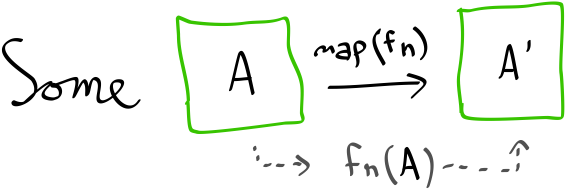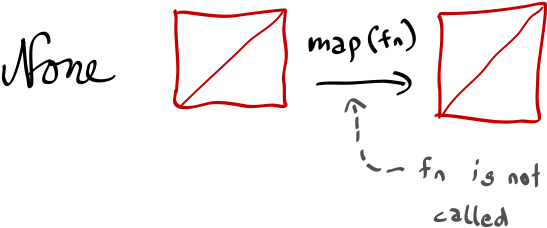Functional Library: Null
Tony Hoare famously described the invention of null references as a Billion Dollar Mistake.
Nulls are something we need to deal with in almost any language. Any value that can be null must be null checked. An example of a very common error that will arise when nulls are present is:
PHP Fatal error: Call to a member function bar() on a non-object in foo.php on line n

One of the ways to deal with this problem is the Null Object pattern, that
usually works quite well for behaviour, e.g. NullLogger. But it does not
work well at all for values, e.g. NullAddress.
Option
Luckily, there is a better Option.
How often have you written this piece of code:
$user = $repo->find($id);
if (!$user) {
return null;
}
$address = $user->getAddress();
if (!$address) {
return null;
}
return $address->asText();
Have you ever thought to yourself there must be a better way?
There is a better way.
return $repo->find($id)
->map(method('getAddress'))
->reject(null)
->map(method('asText'));
All of the null checks are gone. It is now just one single expression that describes the calls.
Option (aka Option Type) is a type that encodes an optional value. In
other words, you can either return something, or nothing. This is quite
similar to returning null. However, because everything is wrapped in an
Option object, you no longer need to have null checks everywhere.

Some wraps a value
The previous example needs a bit of explanation. First of all,
Repository::find() is no longer returning User|null, it is now returning
Option<User>.
Some and None are subtypes of Option. These are the two possible types that an Option can be.
Some is an object that represents (and wraps) a value. You return a Some when you are not returning null.
None on the other hand represents the lack of a value. It is more or less
the equivalent of a null.
Here is an example of how find could be implemented to return an Option.
use PhpOption\None;
use PhpOption\Some;
function find($id)
{
$user = $this->em->find(User::class, $id);
if (!$user) {
return None::create();
}
return new Some($user);
}
Now it turns out that such a construction rather common. So there is a shortcut to achieve the same thing.
use PhpOption\Option;
function find($id)
{
$user = $this->em->find(User::class, $id);
return Option::fromValue($user);
}
That's how you produce an Option object.

Map
A common way to consume an option is to use map. If you read the previous
post on iteration you may be confused at this point. Doesn't map refer to
mapping a function over a sequence?
Well, it turns out that many of the things that apply for sequences can be generalized to support other types of containers too. Yes, a sequence is just a container for a bunch of values.
An Option is just a container for an optional value. Just as you can map over a sequence to create a new sequence, you can map over an Option to create a new Option.
A different way of thinking about it is this. Instead of calling a function on a value:
fn($foo);
You ask the Option container to apply a function for you:
$foo->map('fn');
In case of Some, map takes the value out of the container, runs it
through the function that was passed in, then returns a new Some
containing the transformed value.

In the case of calling map on None, map will not call the provided
function at all. It will just return another None instead.

This means you can call map on None as many times as you want, it will
just ignore the calls.
Method
Just as a little side-note, the method function in the original code sample
is this little helper (also present in nikic/iter):
function method($name)
{
return function ($obj) use ($name) {
return $obj->$name();
};
}
It creates a callable that will call the given method on any object it receives.
Reject
The reject call is a negative filter. If the Option's value matches the
rejected value, it returns None.
Therefore, reject(null) will turn null values into None. At least it's
one way of doing that conversion.
Note: Another way of dealing with this is to make
getAddressreturn a Some or None directly and usingflatMapinstead ofmap.
Get
map is used to transform an Option.
However, that will return a new Option object. So in order to get the actual
value out, you need to use get or one of its variants. This means that you
can use Option in most of the code internally, and then just call get at the
very end.
Going back to the original example, suppose that code were the body of a
getAddressTextForId function. The caller of that function will get an
Option, and will have to unwrap it.
$addressText = getAddressTextForId($id)->get();

However, if this is a None, you will get a RuntimeException with message:
None has no value. In most cases, this is not a very nice way to fail.
For that reason, there are some alternatives, such as getOrElse, which takes
a default value to use in case of None.
$addressText = getAddressTextForId($id)
->getOrElse('No address provided.');

getOrCall, which takes a function that produces a value in case of None.
$addressText = getAddressTextForId($id)
->getOrCall('makeDefaultAddress');
And also getOrThrow, which is the same as the default behaviour of get,
but allows you to throw a custom exception instead.
$addressText = getAddressTextForId($id)
->getOrThrow(new AddressNotFoundException());
This covers the most common cases of unwrapping. There are a few more ways to
consume Option, look at the Option class if you're interested.
Library
The above example is based on Johannes Schmitt's impressive PhpOption library. Take a look at the blog post he published yesterday. The implementation of the library is strongly inspired by the option type available in Scala.
A very common problem in programming is that of null references. We often forget to check if a value is null. In dynamically typed languages, we have even less chance to know if a function could return null. And if we do put in the null checks, they add horrible clutter to the code base.
The Option type solves this problem. It wraps values in a container. It forces
callers to map their transformations. It allows nulls (represented as None)
to propagate without any problems.
The Option type is the same thing as the Maybe monad in Haskell. If you're interested: Functors, Applicatives, And Monads In Pictures, Taking Monads to OOP PHP.
